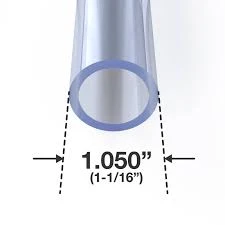Aug . 14, 2024 01:01 Back to list
Exploring the Applications and Benefits of High Density Polyethylene Board in Various Industries
High-Density Polyethylene Board A Comprehensive Overview
High-Density Polyethylene (HDPE) boards are increasingly becoming a staple in various industries due to their unparalleled strength, durability, and versatility. Produced from high-density polyethylene resin, these boards are characterized by their high strength-to-density ratio, which makes them suitable for a wide range of applications, from construction and manufacturing to consumer products and environmental solutions.
Composition and Properties
HDPE is a thermoplastic polymer made from the polymerization of ethylene. Its molecular structure contributes to its impressive properties, including resistance to impact, moisture, and chemicals. Unlike other materials, HDPE boards do not absorb water, making them ideal for outdoor applications where exposure to moisture is a concern. The non-porous nature of HDPE also means that it is resistant to mold, mildew, and bacteria, ensuring a cleaner and safer environment.
In terms of density, HDPE boards typically range from 0.93 to 0.97 g/cm³, giving them a robust profile. Their high tensile strength means they can withstand heavy loads without bending or breaking, making them suitable for heavy-duty applications. Furthermore, HDPE boards exhibit excellent UV resistance, ensuring that they maintain their structural integrity and aesthetic appeal even after prolonged exposure to sunlight.
Applications
1. Construction and Building One of the most significant applications of HDPE boards is in the construction industry. They are used for creating durable roofing materials, wall panels, and insulation sheets. Their waterproof qualities also make them ideal for applications in damp environments, such as basements and foundations.
2. Outdoor Furniture HDPE boards are widely used in manufacturing outdoor furniture due to their weather resistance. Furniture made from HDPE is not only resistant to fading and cracking but is also easy to clean and maintain. Many parks, resorts, and backyards utilize HDPE furniture, contributing to sustainable practices as these boards can be recycled at the end of their life cycle.
high density polyethylene board

3. Signage The signage industry has also embraced HDPE boards. Due to their durability and ability to withstand harsh weather conditions, they are frequently used for outdoor signs, safety boards, and informational signs. Their ability to hold vivid colors makes them visually appealing, enhancing communication and visibility.
4. Environmental Applications HDPE boards are employed in environmental solutions, particularly in waste management and containment systems. They are used to create liners for landfills, ponds, and other containment systems due to their impermeable nature. This capability helps prevent environmental contamination and supports sustainable waste management practices.
Advantages
The advantages of HDPE boards are multifaceted. They are lightweight yet sturdy, allowing for easy handling and installation. Their resistance to chemicals and moisture reduces maintenance costs, offering long-term savings for businesses and consumers alike. In addition, HDPE boards can be easily fabricated, allowing manufacturers to create customized solutions that meet specific requirements.
Moreover, the eco-friendly nature of HDPE cannot be overlooked. As a recyclable material, it contributes to the circular economy, reducing waste and conserving resources. Many manufacturers are now focused on producing HDPE boards from post-consumer recycled materials, further enhancing their sustainability profile.
Conclusion
In conclusion, high-density polyethylene boards represent an innovative and practical solution across diverse sectors. Their combination of strength, durability, and environmental benefits makes them an appealing choice for businesses and consumers alike. As industries continue to seek sustainable and efficient materials, the use of HDPE boards is expected to grow, leading to a more sustainable future. Whether in construction, furniture design, or environmental applications, HDPE boards offer a versatile, reliable, and eco-friendly option that meets the demands of modern society.
-
HDPE Pipe Fittings: Durable, Leak-Proof Solutions
NewsAug.16,2025
-
Premium CPVC Sheet: High-Temp & Chemical Resistant Solutions
NewsAug.15,2025
-
Durable PPR Pipe for Hot & Cold Water Systems - Easy Install
NewsAug.14,2025
-
Durable HDPE Sheet | Versatile & Impact-Resistant Plastic
NewsAug.13,2025
-
Premium PVC Soft Sheets: Clear, Flexible & Durable
NewsAug.12,2025
-
Premium PVC Round Rods: Durable, Chemical Resistant, Easy to Machine
NewsAug.11,2025

